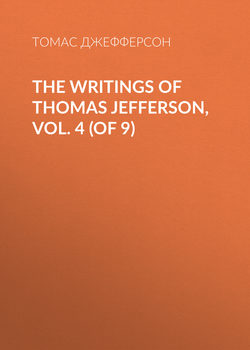Читать книгу The Writings of Thomas Jefferson, Vol. 4 (of 9) - Томас Джефферсон, Thomas Jefferson - Страница 3
TO COLONEL MONROE
ОглавлениеPhiladelphia, June 28, 1793.
Dear Sir,—I have to acknowledge your favor of May 28. I believe that through all America there has been but a single sentiment on the subject of peace and war, which was in favor of the former. The Executive here has cherished it with equal and unanimous desire. We have differed perhaps as to the conduct exactly adapted to the securing it. We have as yet no indirections of the intentions or even the wishes of the British government. I rather believe they mean to hold themselves up, and be led by events. In the meanwhile Spain is so evidently picking a quarrel with us, that we see a war absolutely inevitable with her. We are making a last effort to avoid it, but our cabinet is without any decision in their expectations of the result. This may not be known before the last of October, earlier than which I think you will meet. You should therefore calculate your domestic measures on this change of position. If France collected within her own limits shall maintain her ground there steadily, as I think she will, (barring the effect of famine which no one can calculate,) and if the bankruptcies of England proceed to the length of an universal crush of their paper, which I also think they will, she will leave Spain the bag to hold; she is emitting assignats also, that is to say exchequer bills, to the amount of five millions English, or one hundred and twenty-five millions French; and these are not founded on land as the French assignats are, but on pins, thread, buckles, hops, and whatever else you will pawn in the exchequer of double the estimated value. But we all know that five millions of such stuff forced for sale on the market of London, where there will be neither cash nor credit, will not pay storage. This paper must rest then ultimately on the credit of the nation as the rest of their public paper does, and will sink with that. If either this takes place, or the confederacy is unsuccessful, we may be clear of war with England. With respect to the increase of our shipping, our merchants have no need, you know, of a permission to buy up foreign bottoms. There is no law prohibiting it, and when bought they are American property, and as such entitled to pass freely by our treaties with some nations, and by the law of nations with all. Such accordingly, by a determination of the Executive, will receive American passports. They will not be entitled indeed to import goods on the low duties of home-built vessels, the laws having confined that privilege to these only. We have taken every possible method to guard against fraudulent conveyances, which, if we can augment our shipping to the extent of our own carriage, it would not be our interest to cover. I enclose you a note from Freneau, explaining the interruption of your papers. I do not augur well of the mode of conduct of the new French minister; I fear he will enlarge the evils of those disaffected to his country. I am doing everything in my power to moderate the impetuosity of his movements, and to destroy the dangerous opinions which has been excited in him, that the people of the United States will disavow the acts of their government, and that he has an appeal from the Executive to Congress, and from both to the people. Affairs with the Creeks seem to present war there as inevitable, but that will await for you. We have no news from the northern commissioners, but of the delay likely to be attempted by the Indians; but as we never expected peace from the negotiation, I think no delay will be admitted which may defeat our preparations for a campaign. Crops here are likely to be good, though the beginning of the harvest has been a little wet. I forgot whether I informed you that I had chosen a house for you, and was determined in the choice by the southern aspect of the back buildings, the only circumstance of difference between the two presented to my choice. Give my best love to Mrs. Monroe, and be assured of the affectionate esteem of, dear Sir, your friend and servant.
